Campo’s Corner: The history and times of Paul Gallen, Sharks legend and willing rugby league villain
Unless you wear black, white and blue there’s a fair chance you don’t like Paul Gallen, but that’s a deal the retiring Sharks legend made long ago writes NICK CAMPTON.
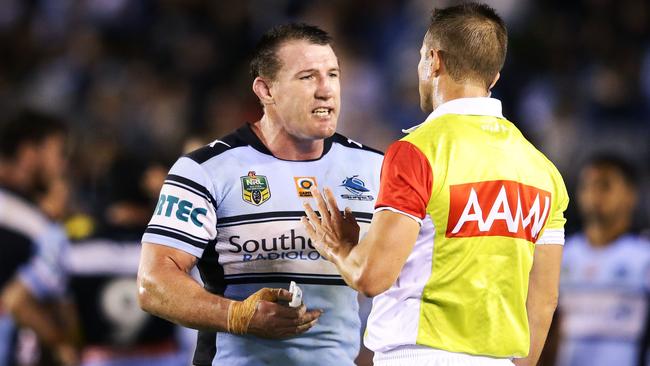
Sharks
Don't miss out on the headlines from Sharks. Followed categories will be added to My News.
FINALS: Can Tigers break the drought
It is one of rugby league’s great enigmas that the two longest serving and decorated players in the game are also two of the most disliked by the common rugby league punter.
For so many years, Paul Gallen and Cameron Smith were the faces of Australian rugby league’s two largest tribes and until the recent hysteria around Smith reached an unsettling fever pitch, Gallen was a consistent bet as the most disliked player in the game among fans.
So as Smith has the Storm salary cap drama, Gallen has the ASADA scandal. Neither incident should define either man’s career but many rugby league people foster long memories and will never miss an opportunity for bitterness at past transgression.
Gallen is not being celebrated the way Smith will be when he retires, and there’s probably a part of Gallen which wants it that way. He remarked on Tuesday that nobody from the NRL was down at Cronulla, there was no ring on the way for his wife courtesy of head office.
There will be a stadium full of Sharks fans on Sunday though, as Gallen (and the club) say farewell to the home they’ve known for so long. It is a closed event. Nobody else will be invited, but even if they were would they want to come?
Stream the 2019 NRL Telstra Premiership on KAYO SPORTS. Every game of every round Live & On-Demand on your TV, computer, mobile or tablet. Get your 14 day free trial.
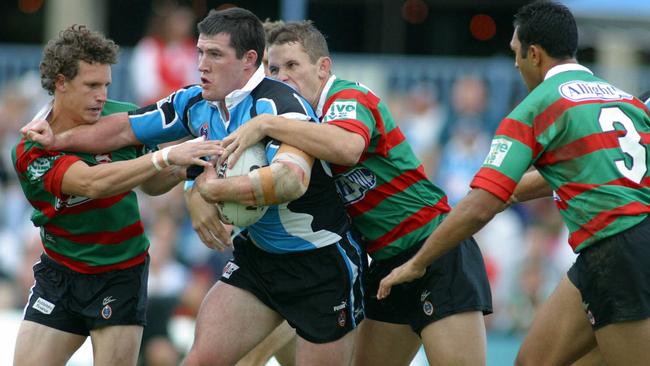
It’s a cliche to say teams take on the properties of their leaders but it’s an adage that lives on for a reason. Gallen has been a leader through example for a very long time now – he first captained the Sharks in 2007 and has held the job full time, for the most part since 2008 - only Smith has been in power longer. Once Gallen assumed the role, Cronulla were almost instantly reborn in his image.
Gallen is a player of iron will and absolute certainty. In the Gallen tributes which are sure to come later this week, count how many times the phrase “ultimate competitor” comes up from former teammates. Often players are described as doing “whatever it takes to win” and we hear it so often it loses meaning.
With Paul Gallen, such a description is literal. Gallen takes the field with a need to win that is so strong it can take him to dark places. He has had control of that intensity for many years now, but there was a time when it had total control of him.
There’s a beast in Paul Gallen, and in his early years that beast held total sway as he did and said some heinous things on the field even as he became one of the game’s elite forwards. That’s the other side of “whatever it takes”, the side that isn’t just a motivational slogan or a half-baked quote in an interview. Most players – most people even – have a point they will not pass in the quest for victory.
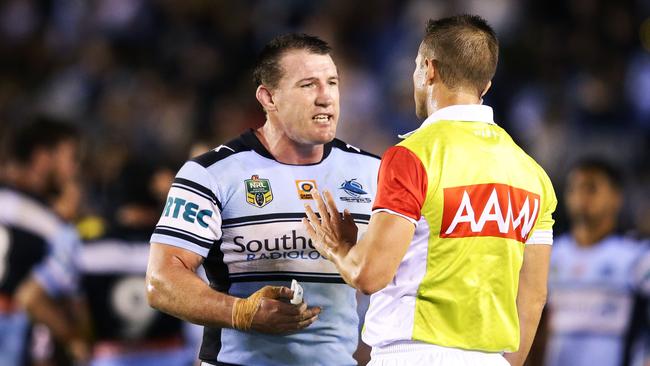
Such a point never existed for Paul Gallen. He’d wrestle a grizzly bear if that’s what it took, but if he had to coathanger someone, or play up an injury, or do something sly in the ruck to make sure his opposite number got up that little bit slower, or scream at a referee regarding some perceive injustice then he’d do that as well, without hesitation.
Sometimes it went too far – Gallen lost the captaincy in 2009 to Trent Barrett and Luke Covell following a string of distasteful incidents on the field and didn’t get it back until 2011. Cronulla tried and failed to bash and niggle their way to ultimate victory for many years as they alternated between fighting runs to the finals that were snuffed out by more potent teams and dancing on the edge of a cliff as scandals threatened to destroy the club entirely.
But at their best and worst the Sharks were a reflection of Gallen, a reality which endures to this day. How many times have you heard a commentator or a journalist or a fan or yourself describe the Sharks as nigglers, fighters, competitors? How many times have the Sharks taken on a more talented team and beaten them cause they wanted it more and because they were willing to fight harder for longer?
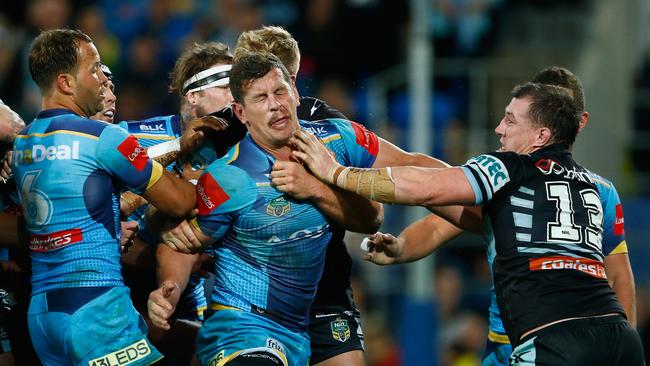
Gallen and his Sharks were competitors in the most basic sense of the word and that can be ugly sometimes, but that’s what teams want and what coaches yearn to build. We all want our teams to despise losing as much as we do, don’t we? We all want them to give everything, until one day we realise that everything is too much to give.
Take 2008, Gallen’s first year as captain, as a creation story and example. The Sharks scored 451 points that year, which gave them the second-worst attack in the competition. Only Canterbury, the wooden spooners, were worse. With less weapons than just about everyone in the league, the Sharks finished third on for and against with Manly and Melbourne, the twin titans of the time.
The Storm and Sea Eagles had points differentials of +302 and +290, Cronulla’s was +67. Their shortcomings were exposed in the preliminary final, a 28-0 smashing at the hands of a Melbourne side without Smith, but they had no right to have gone as far as they did, just like Gallen, by all the laws of nature and the physical hand he was dealt, didn’t have the right to become the player he has and do the things he’s done. They, like their leader, forced themselves to be greater by being totally uncompromising and willing to fight in the gutter and bite off your nose if that’s what it took.
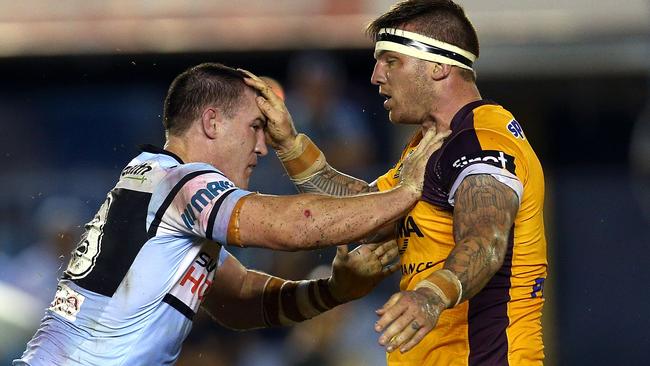
That’s the kind of attitude the Blues needed when Gallen was appointed captain in 2011. In 2009 and 2010 Queensland were at the absolute apex of their dynasty and it felt as though the Blues wouldn’t just lose this series and the next, they’d lose every series, forever, until the heat death of the universe.
The Blues needed someone like Gallen, who didn’t care what Queensland were supposed to do or what they could do, he’d bash them and hit them and belt them until they broke, even if it took forever. In his second game as skipper, Game II 2011, Gallen played the finest match of his life, the greatest game by any Origin forward this century at least, in a Blue victory which was the first chink in the armour of Maroon invincibility.
It took years for it to break completely, as Gallen’s appetite for work turned gluttonous and other forwards following his example consumed the direction and intention of the side by the end. But finally, gloriously, it did, and the 2014 series remains one of Gallen’s finest hours. In fitting fashion for Gallen, it’s also overlooked because so many fans don’t like him. The reason the 2018 series was more celebrated was because the team was much easier for rugby league fans to latch onto – they had none of Gallen’s baggage. Gallen is a monumental figure in Blues history but that’s also the cost of doing whatever it takes.
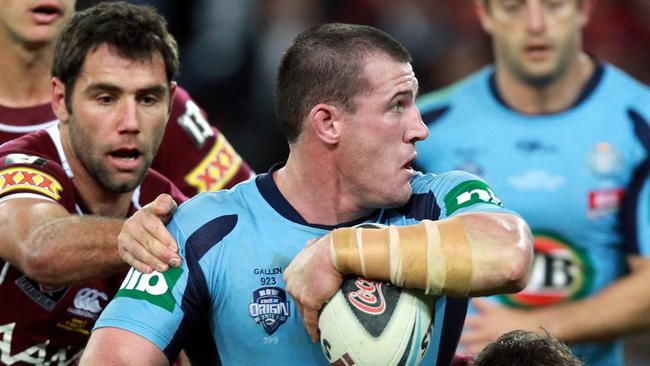
Gallen could not will the Sharks to victory in the same way, and it took the arrival of James Maloney, the emergence of Andrew Fifita and Wade Graham, the resurgence of Michael Ennis, the resurrection of Ben Barba and the debuts of Jack Bird and Valentine Holmes for Cronulla to evolve into a totally rounded team and claim the prize that’d eluded them for so long.
When the Sharks won the comp in 2016 they had the third best attack in the league, but they never lost their edge, and it was an edge Gallen sharpened himself. The Storm were a better side that year, but the Sharks were better on the day it mattered and deserved their 14-12 win. The points they could score took them to the brink of glory, but for the last mile they had to fight their way through and they were all fighters because that was what Gallen had helped make them.
We can’t know how Gallen will be remembered after all this ends, but the smart money is he won’t get the credit he should. Putting together one’s Team of the Decade has been all the rage in recent weeks and the amount of people overlooking Gallen is astounding.
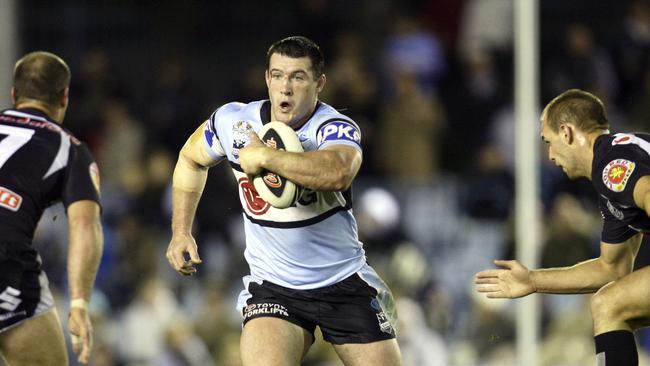
From 2010 to 2013 he was the best forward in the game, the Blues’ best player and the most important forward in the Test side. Before Jason Taumalolo shifted the spectrum, nobody in rugby league could match his yardage work – he has 12 seasons where he averaged over 150 metres. He was an elite forward until 2017 and even though his numbers are down this season (he’s playing his fewest minutes and averaging his least metres since 2002) they’re still respectable for any player, let alone someone in his 19th season.
There’s nothing I can write to make you change your mind on Paul Gallen. He’s been around for so long everyone has already made up their mind on him. The legacy of a career spent pushing the envelope is a lack of wider recognition, but I doubt Paul Gallen or anyone at Cronulla cares. They traded the love of the masses for a shot at victory long ago, and given everything that’s happened since, even with the club teetering on the brink of death more than once and Gallen himself losing more games than any other player in history, that’s probably a deal both would gladly make again.
JOEY LEILUA IS MADNESS OR BRILLIANCE OR BOTH
It had been a while since we were treated to a real Joey Leilua moment but we got the double in Canberra’s loss to Manly when he cleaned up Reuben Garrick as the Sea Eagles winger scored a try.
Not only did Leilua give away two easy points, he got himself suspended for two games – the latter might actually be worse given his lack of match fitness. The Samoan international is a controversial player by nature and plenty believe Canberra are better off without him, given his penchant for ill-discipline and shaky defence. My learned colleague Tim Williams’ suggestion of Leilua playing at least a week in reserve grade is looking better all the time.
But this has always been the way with Leilua. Taking what comes and hoping the coin lands the right way up is the only way to deal with him. Given the form he’s displayed in the past I argue it’s always a risk worth taking – and not for nothing, before his neck injury Leilua was one of the form centres in the competition and had managed to avoid any “moments” like the one he had on Sunday.
Canberra have shown they can still be a finals team with Nick Cotric at right centre and Bailey Simonsson on the wing, but for them to win the title they need Leilua and they need him at his best. Canberra’s improvement this year has been built on defence and their attack, while still dangerous, is not as well-structured as it has been in recent years.
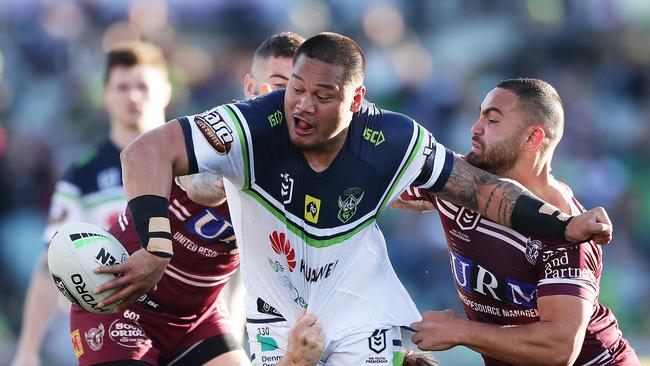
The Raiders are a lot more conservative in attack than one might think or than their reputation suggests – they’re first in the league for dummy half runs, second for one-pass hit ups, last for general play passes and last for line engagements.
They can struggle inside the attacking 20 and have the second-least try assists of any team in the top eight. Apart from their left hand side, where Jack Wighton combines well with Jarrod Croker and Elliott Whitehead, much of their attack is based on individuals making plays, taking advantage of broken play or beating a man to create a chance rather than anything too meticulously constructed and executed.
They need Leilua’s extra creativity and game breaking abilities to take on and beat the best teams in the competition consistently, and they must hope the red mist doesn’t descend. The Raiders might not be able to win the competition with Joey Leilua but it’s difficult to see them winning it without him.
THE GOLDEN HOMBRE
Is there anything more thrilling than when a big man gets into the clear and attempts an ill-advised dummy, or perhaps a chip kick?
Is there anything greater than when a large lad decides the time has come for him to show the world the ball skills he knows lurk deep within?
Is there anything that lifts the spirit more than a hefty fellow crashing across the stripe for his second NRL try in his 179th first grade match?
I say no, and to honour these big fellas each and every week of the year, which many have dubbed #BigManSeason, we hand out The Golden Hombre, named after Todd Payten, the biggest halfback God ever created.
Only one possible winner this week and that’s Penrith backrower Isaah Yeo. The Panthers attack is an absolute chore to watch but Yeo made it happen against the Cowboys when he collected a James Maloney bomb, put in a weird chip/grubber hybrid that also had torpedo spin on it and regathered to score under the posts. Take note Penrith, Yeo is showing you the way.
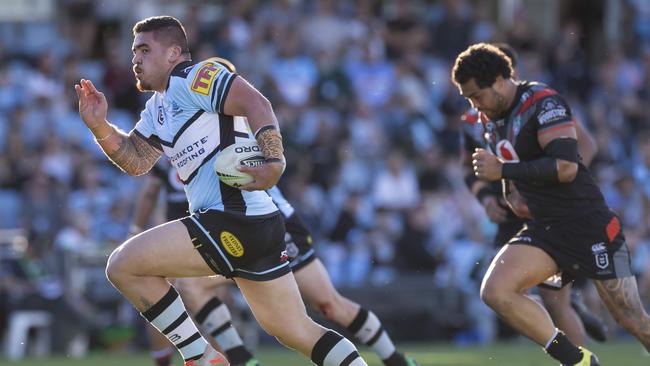
A GUY YOU SHOULD KNOW
I have been very impressed with Cronulla prop Braden Hamlin-Uele for some time now and the big Shark had another excellent display against the Warriors on the weekend.
Big and mobile, Hamlin-Uele is something of a mature-age rookie – he made his NRL debut for the Cowboys in 2017 but had only played two games before this season.
He’s a good example of the benefits of a season or two in reserve grade and at 24 still has his best footy in front of him. Hamlin-Uele and Jack Williams shape as Cronulla’s key forwards of the future and both could be starters next year if Matt Prior exits alongside Gallen.

